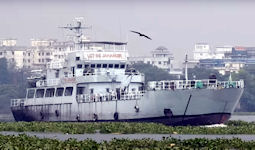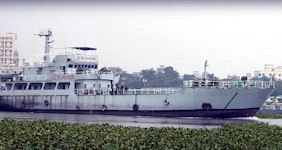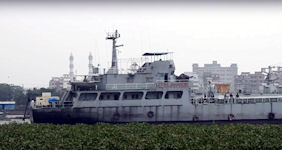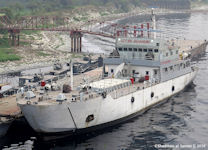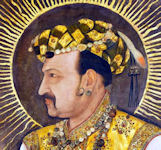LCT BS Jahangir
The LCT Jahangir is the Landing Craft Tank used by the Riverine Engineering Battalion of the Bangladesh Army. This LCT can carry 2 MBT or APC of the army and about 60 armed soldiers. It uses 2 12.7x99mm heavy machine guns and 7.62x39mm machine guns as self defense system. MANPAD can also be kept for additional security. Chinese Type 074-class landing ship (NATO reporting name: Yuhai-class).
SALIM, the favourite son of Akbar, succeeded his father in Jahangir, 1605, and ruled until 1627 under the title of JAHANGIR, or Conqueror of the World. His reign of twenty-two years was spent in reducing the rebellions of his sons, in exalting the influence of his wife, and in drunken self-indulgence. In spite of long wars in the Deccan, he added little to his father's territories. India south of the Vindhyas still continued apart from the northern Empire of Delhi. Malik Ambar, the Abyssinian minister of Ahmadnagar, maintained, in spite of reverses, the independence of that kingdom. At the end of Jahángir's Rebellion reign, his rebel son, Prince Sháh Jahán, was a refugee in the of his son. Deccan, in alliance with Malik Ambar against the Mughal troops. The Rajputs also began to re-assert their independence. In 1614, Prince Shah Jahán on behalf of the Emperor defeated the Udaipur Rájá. But the conquest was only partial and for a time. Meanwhile, the Rajputs formed an Revolt important contingent of the imperial armies, and 5000 of of the Rajputs. their cavalry aided Shán Jahán to put down a revolt in Kábul. The Afghán Province of Kandahár was wrested from Jahángir by the Persians in 1621.
The new Emperor conformed more strictly to outward observances, but lacked the inward religious feeling of his father. While he forbade the use of wine to his subjects, he spent his own nights in drunken revelry. He talked religion over his cups until he reached a certain stage of intoxication, when he fell to weeping, and to various passions, which kept them to midnight.' In public he maintained a strict appearance of virtue, and never allowed any person whose breath smelled of wine to enter his presence. A courtier who had shared his midnight revels, and indiscreetly referred to them next morning, was gravely examined as to who were the companions of his debauch, and one of them was bastinadoed so that he died.
During the day-time, when sober, Jahangir tried to work wisely for his Empire. A chain hung down from the citadel to the ground, and communicated with a cluster of golden bells in his own chamber, so that every suitor might apprise the Emperor of his demand for justice without the intervention of the courtiers. Many European adventurers repaired to his court, and Jahangir patronized alike their arts and their religion. In his earlier years he had accepted the eclectic faith of his father. It is said that on his accession he had even permitted the divine honours paid to Akbar to be continued to himself.
The principal figure in Jahángir's reign is his Empress, Núr, the Light of the World. Born in great poverty, but of a noble Persian family, her beauty won the love of Jahangir while they were both in their first youth, during the reign of Akbar. The old Emperor tried to put her out of his son's way, by marrying her to a brave soldier, who obtained high employment in Bengal. Jahangir on his accession to the throne commanded her divorce. Her husband refused, and was killed. His wife, being brought into the imperial palace, lived for some time in chaste seclusion as his widow, but in the end emerged as Núr Jahán, the Light of the World. She surrounded herself with her relatives, and at first influenced Jahangir for his good. But the jealousy of the imperial princes and of the Mughal generals against her party led to intrigue and rebellion. In 1626, her successful general, Mahábat Khán, found himself compelled, in self-defence, to turn against her. He seized the Emperor, whom he kept, together with Núr Jahán, in captivity for six months. Jahángír died in the following year, 1627, in the midst of a rebellion against him by his son Shah Jahan and his greatest general, Mahabát Khán.
|
NEWSLETTER
|
| Join the GlobalSecurity.org mailing list |
|
|
|


